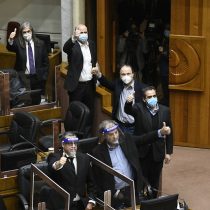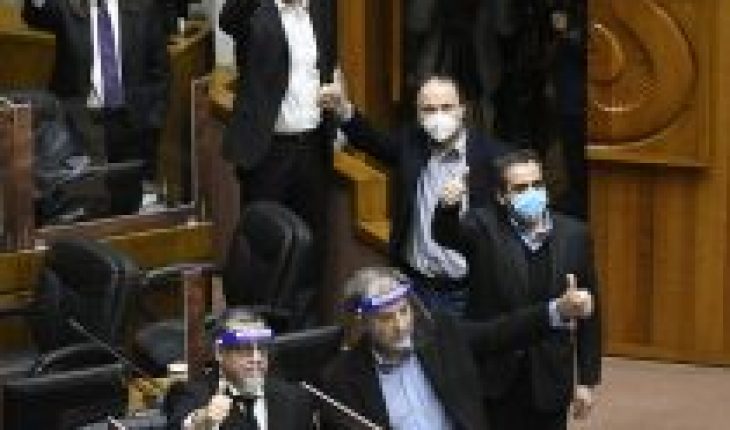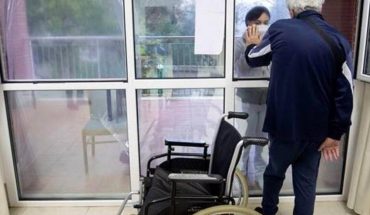
Like the chronicle of an announced vote, by 29 votes in favor, 13 against and 1 abstention (the RN Francisco Chahuán), the Senate generally approved the reform that allows the extraordinary withdrawal of up to 10% of its planned savings, with the support of 5 parliamentarians from Chile Vamos.
After the approval, after seven hours of debate, the Chamber is now in the process of curing the indications of the project, and tomorrow the Chamber of Deputies opened a session between 10 a.m. to 3pm for its dispatch in the third legislative process.
As announced, the five official senators who had advanced their vote in favor (UDI José Durana, David Sandoval and Iván Moreira, in addition to RN Manuel José Ossandón and Juan Castro), approved the project, adding to the 24 votes of the opposition.
The 29 votes achieved exceed the 26 required by the three-fifths, a quorum that remained immovable despite Chile’s last-minute attempt to raise the quorum to two-thirds, in a maneuver by Senators Andrés Allamand (RN) and Victor Perez (UDI), seconded by the Minister of the Segpres, Claudio Alvarado. The issue was presented at the beginning of the room session, after the official senators warned that they would use “reservation of constitutionality,” and delayed the start of the debate.
But in the discussion there were no surprises, and very early, The Coin assumed defeat. “The outcome of this vote is already written. We’re not going to have any surprises in that sense. But we would have liked the debate to have been deeper and more thoughtful,” the Minister General of the Presidency, Claudio Alvarado, said in his speech.
The Government played its last tokens in the session, but without success, by a minutes from the Directorate of Budgets (Dipres) that raised the tax impact of the project to US$6,002 million, equivalent to approximately 2.5% of GDP. But the figure did not unmote senators.
“It is a significant figure, a fiscal expenditure from future generations,” said the Minister of Finance, Ignacio Briones, one of the faces of the government most impacted by the legislative failure that this reform means. In addition, the head of the tax wallet emphasized that alongside that direct cost “we are also talking about $1.060 billion for non-taxation for the higher-income segment of our population, and the truth is that this is entirely inentendible.”
In his speech, Briones not only delved into these figures. He also insisted that it is a “bad project,” which “uses the Constitution,” “weakens pensions” and “opens a door that doesn’t close anymore.” He also called it “far the most regressive thing that has been seen” and questioned those who support him wondering “where the convictions lie.” By the way, he also fussed to be universal, considering that it was initially said to be a middle-class-focused aid.
Just before the vote, Interior Minister Gonzalo Blumel took the floor, insisting that “this project is not a good proposal” and assumed that “we have failed in the tone and substance of the debate”.
In this regard, he asked “not to abandon the path of agreements”. “I regret that this debate has forgotten the June agreement, because that’s where we draw up a roadmap and it’s been diluted,” he said, insisting on a call that we “respect the rules of the game, even if some of them may not like it.”
Chile’s “dipscolos”
But beyond the speeches of government people, all the attention was focused on the interventions of the right, especially when the divisive senators took the floor.
“I, the worst of all, reiterate my support for this project,” Senator Ivan Moreira (UDI) said, in a lighted alocution where he even quoted Dalai Lama and said he will defend himself if the UDI takes him to the Supreme Court for voting in favor: “You will be able to get me out of the UDI but you will not get the UDI out of my heart.” In the same vein, his colleague José Durana said he is available to pay the “misunderstanding costs or sanctions within our conglomerates or coalitions.” “My vote is not ideological and does not transgress my strong and firm principles of centre right,” he said. Meanwhile, David Sandoval argued that “in the last time Chile is validly claiming that we have been blind and deaf in meeting their demands and demands,” and was emphatic in “today I don’t vote for the left, I don’t vote against my party.”
Another speech expected was that of Senator RN Manuel José Ossandón, who also ratified his vote in favor of pension withdrawal, noting “today vote for the real Chile, by Puente Alto, La Pintana (…) for people suffering from the indolence of the political world and that of a state that has been looking to the side for more than 30 years.” By the way, he nodded to the constituent plebiscite: “I approve today and I will also do it on October 25”
There was no shortage of calls to the government in this group of senators. Moreira was emphatic that the project “is not unconstitutional,” while Juan Castro (RN) also warned the government. Referring to the Government’s intention to block the enactment of the law, he emphasized that “it has to be fast, universal, without small print and without a presidential veto.”
But it was also the opportunity for historical allusions, such as that of Senator UDI Ena von Baer to Salvador Allende, or internal “account passes,” such as Senator Allamand’s to his party’s president, Mario Desbordes, and the mayor of Las Condes and the main presidential charter in his sector, Joaquín Lavín. “Some care much more about Monday’s polls than consistency,” the former minister said, adding that the president of National Renewal “opened a door he was unable to close” and “the main letter on the right has been abruptly transformed into an enthusiastic enthusiast of the idea.”
In initiating his speech, Allamand also accused the opposition of using “legal loopholes typical of a history-adicating era” to seek to install a “de facto parliamentaryism” through a project he categorized as a “classic recipe for populism.” In a campaign of terror, Allamand spoke of a “safe prelude to a political crisis, prologue to ungovernability and a return to violence.”
The opposition’s arguments
Criticism of the AFP system and the Government’s response in this crisis abounded in the opposition, with warnings also that the Executive may take the path of the presidential veto or appeal to the Constitutional Court. “It would be inadmissible for the government to resort to the TC or the veto, it would be a brutal social protest in this country,” said Socialist Senator Alfonso de Urresti. Another topic present in the interventions was the Government to move towards real planned reform.
Senator José Miguel Insulza (PS) argue that “the Government has put aside the tragedies of the middle classes (…) What this project proposes is the only solution left,” while former Senate President Jaime Quintana (PPD) argued that “today these moneys are more useful in the hands of families than on stock exchanges or banks.”
Meanwhile, DR Sen. Juan Ignacio Latorre argued that the initiative “is bread for today, but social security for tomorrow” and his colleague DC Yasna Provoste insisted that “vote in favor of AFP contributors exposed to the threat of waste. They are labeled irresponsible when they have expressed their support for this initiative.”
One of the parliamentarians at the center of the debate was PPD Sen. Ricardo Lagos Weber, the target of questions about raising the idea of taxing the highest salaries that withdraw their money from the planned savings, which provoked a bitter controversy, which eventually made him give up presenting the indication. For this reason, he took advantage of the upper house session to refer to the subject. “The weekend I got the product out of my tax proposal. This indication was chasing those who earned six million pesos up, they paid taxes every month. We’re a small group of Chileans. It was misunderstood, it was thought that we wanted to tax the people who were going to withdraw these moneys, but the virulence of the debate is not going to be healthy and it is not a personal issue,” he said. In conclusion, he noted that “I do not accept that, in a democracy, the way of operating is threats, disqualifications, irony and misinformation.”
Beyond the controversial Lagos Weber assumed that reform that “not being the best, is the option we’re going to approve and I think that’s what’s going to help us.” Were there better alternatives to dealing with the pandemic? Of course, if the state had put the resources, the Chileans would not have asked, with the pressure they are asking for, to withdraw their funds,” he said.
That’s how senators voted





